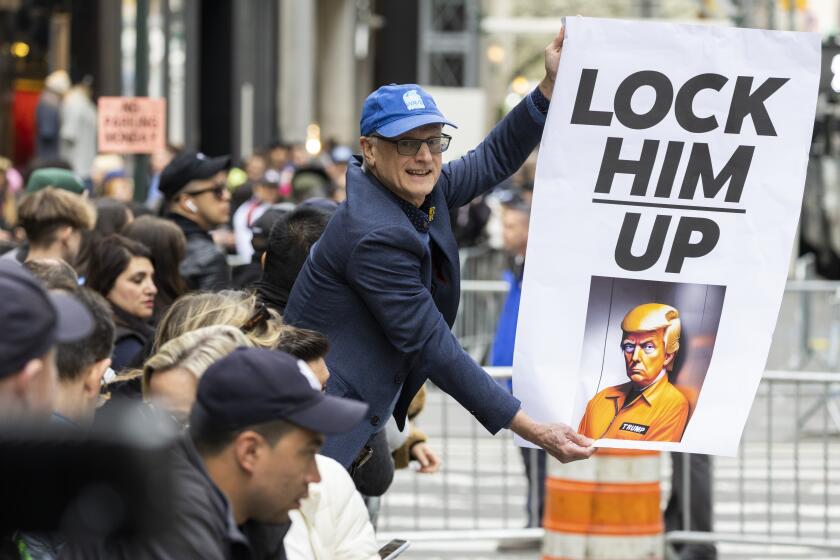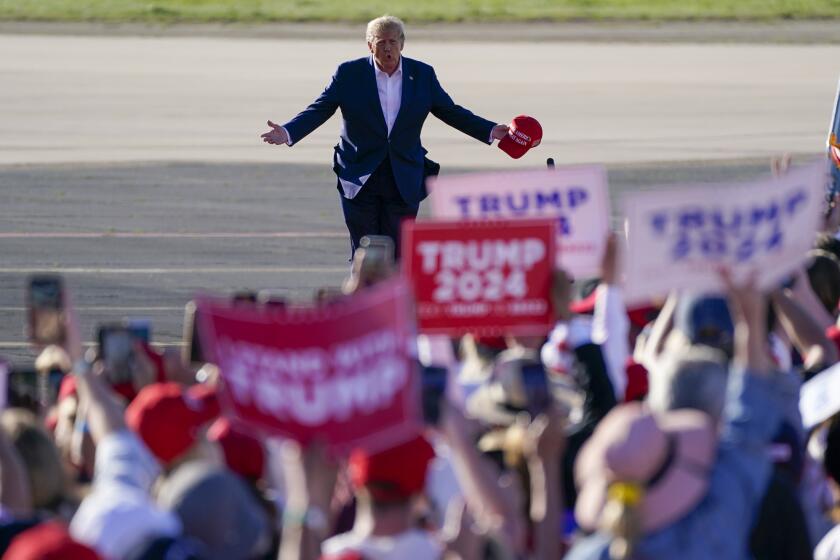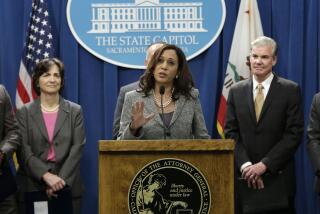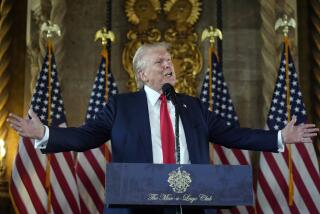Opinion: How Los Angelesâ first female public defender pioneered the rule that led to Trumpâs indictment
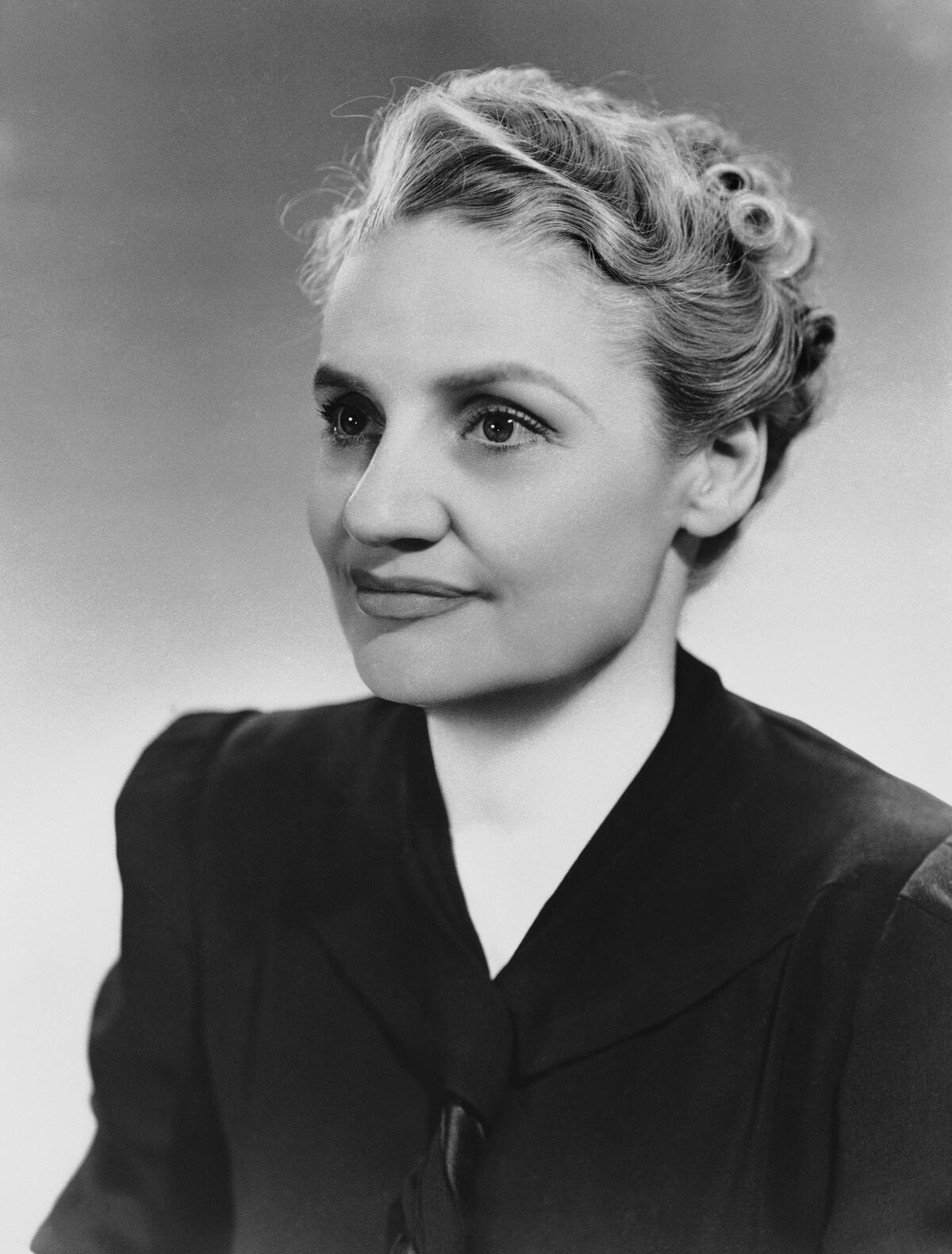
Warren G. Harding was a terrible president, but he did get two things right. He freed an ailing Eugene Debs from federal prison, where Debs had been locked up for criticizing World War I, and he appointed Mabel Walker Willebrandt, Los Angelesâ first female public defender, as assistant attorney general of the United States. Harding gave Willebrandt the thankless task of enforcing Prohibition.
She served for eight energetic years, pioneering the no-holds-barred âWillebrandt doctrineâ that sent Al Capone to Alcatraz and has been used today to turn Donald Trump into our first indicted ex-president. Briefly put, the Willebrandt doctrine encourages prosecutors to use any available crime, even if relatively trivial, to assert the rule of law over a dangerous crook.
During the roaring 1920s, Capone ran the rackets in Chicago â gambling, booze, prostitution â each on a massive scale. Capone wasnât just a successful entrepreneur of human frailty. He was widely believed to have ordered the murder of seven rivals in the St. Valentineâs Day Massacre and was implicated in numerous other violent crimes. Although Capone was convicted of a couple of relatively minor offenses, he was protected from effective prosecution in Chicago for his more serious crimes by a wall of corruption and intimidation.
Think of the case in Manhattan as a mirror image of the Benghazi investigations that took aim at Hillary Clinton. This time the goal is justice, not shaming a political target.
Enter Willebrandt. Frustrated at her inability to convict gangsters like Capone, Willebrandt argued that big-time crooks who were avoiding local prosecution should be prosecuted in federal court for failing to file income tax returns revealing their ill-gotten gains. In 1927, the Supreme Court removed the final obstacle, ruling unanimously that requiring the filing of a tax return revealing income from unlawful activity did not violate the 5th Amendment ban on self-incrimination. In 1948, the court expanded its reasoning to keeping required business records.
Unable to prosecute him for anything else, the Feds unleashed the Willebrandt doctrine on Capone, charging him with failing to file income tax returns from 1924 to 1929. In those days, failing to file was only a misdemeanor. But failing to file to conceal illegal activity was a felony punishable by up to five years in prison. In 1931, a federal jury convicted Capone of failing to file income tax returns in 1925, 1926 and 1927 to cover up his life of crime. He was sentenced to 11 years in prison.
There is, of course, a strong family resemblance between Willebrandtâs prosecutorial zeal in transforming Caponeâs misdemeanor failures to file federal income tax returns into three serious felonies potentially punishable by 15 years in jail, and Manhattan Dist. Atty. Alvin Braggâs effort to parlay Trumpâs misdemeanor failure to keep accurate business records into 34 felony counts each potentially punishable by up to four years in jail.
A Manhattan grand jury voted to indict the former president on charges related to paying hush money to a former porn star. Convicted or acquitted, he is not fit for office.
But is Bragg justified in unleashing the Willebrandt doctrine on Trump? For that matter, was Willebrandt herself justified in prosecuting Public Enemy No. 1 for failing to file an income tax return?
If a contrived tax fraud conviction was the only way to bring a murderous psychopath like Al Capone to justice, I tip my hat to Willebrandt â better a tax fraud conviction than nothing.
But what about Trump? Heâs charged, not with covering up a life of violent crime, but with trying to keep voters from learning about an alleged one-night stand with a porn star. Comparing the relative seriousness of the cover-ups misses the point. Capone was a candidate for the Willebrandt doctrine because his life of violence and lawlessness threatened to make a mockery of the rule of law.
Trump joins the Willebrandt club because his life of sustained attacks on electoral integrity threatens irreparable injury to the fabric of democracy. Trump has turned himself into democracyâs Public Enemy No. 1. That makes him fair game whenever he breaks the law to manipulate the voters.
Burt Neuborne is a professor emeritus of law at NYU Law School and a visiting professor at the UC Berkeley School of Law. He served as national legal director of the ACLU from 1981-86 and was the founding legal director of the Brennan Center for Justice.
More to Read
A cure for the common opinion
Get thought-provoking perspectives with our weekly newsletter.
You may occasionally receive promotional content from the Los Angeles Times.
